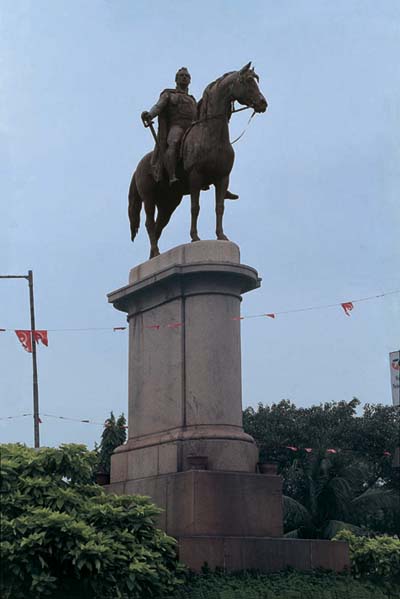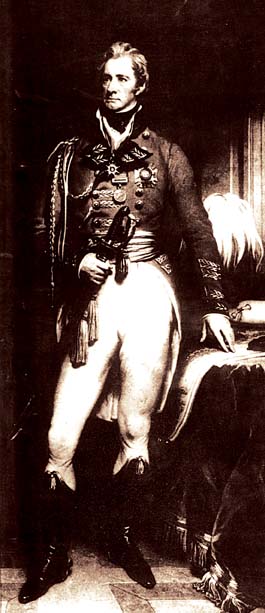Thomas Munro’s first letter to his Mother from Madras provides Simeon Mascarenhas
an insight into his character.

Sir Thomas Munro, remembered for his generosity, by this statue on the Island Ground, Chennai

Sir Thomas Munro |
Sir Thomas Munro, whose statue is on the Island Ground, was a benevolent and fair-minded administrator but what evidence is there that this was actually part of the man’s character? In the course of research over the past year I came across a letter written by Thomas Munro to his mother soon after he landed in Madras on January 1, 1780. Like most of his writings, it reveals the true nature of the writer, especially since it was written to the person he admired most and who was his confidante. But first a little about Munro’s background. Like many of the makers of British India, Munro was a Scot, not an Englishman. Never confuse the two!
Munro’s own letters afford the most vivid and truest account of his life’s work. Having a strong literary bent, he read voraciously. Among his favourites were Anson’s Voyages, Plutarch’s Lives, Spencer, Shakespeare, Smith’s Wealth of Nations, Hume’s History and The Life of Frederick the Great. Though not himself aggressive, he had an absorbing interest in war and tactics. In order to read Don Quixote in the original Spanish he taught himself Spanish with the help of a dictionary and a grammar book. It came in useful: he was paid to translate papers found on a Spanish vessel captured by a privateer (i.e. a pirate) in the employ of a mercantile house in Glasgow. These early earnings he presented to his mother.
Thomas Munro was born on May 27, 1761 near Glasgow, the second in a family of five boys and two girls. His father was a merchant, trading mainly with Virginia, and his mother was the sister of a well-known anatomist, Dr. Stark. Since trade with the rich American colonies was booming, the family was fairly well off. Thomas grew into a tall, robust young man, excelling in all athletic sports. He spent most of his holidays at a country house called Northwoodside, near Glasgow, on the banks of the Kelvin. He loved nothing better than fishing in the stream near the property and swimming, and often cited these pleasures in his letters from India. A childhood attack of measles left him partially deaf, a fact he mentions in his letters.
In 1777, Munro Senior got the 16-year-old Thomas a clerkship in the counting house of Messrs. Somerville and Gordon, West Indian merchants in Glasgow. Soon the magistrates, who were aware of Munro’s military leanings, offered him a lieutenancy post in the corps they were raising. Munro Senior was opposed to the idea, so Thomas reluctantly declined. Given his absorbing interest in matters military, he was bitterly disappointed. But all this was to change very soon.
That same year, 1777, the General Assembly of the young United States of America passed the Act of Confiscation. It required people to swear loyalty to North Carolina, where the General Assembly was located, rather than to the Crown of Great Britain during the Revolutionary War or forfeit their property. The forfeited property could then be sold to help pay debts of the Revolutionary War.
As a result of the Act, Munro’s trading firm went bankrupt in 1778 and the family was reduced to comparative poverty. They might have owned a house and some land, but the money had dried up. Now fallen on hard times, the family, like almost all others who looked to India as a lifeline, sought employment in the East India Company. Thomas’s father was very glad to accept for his son a midshipman’s berth in the mercantile marine of the East India Company. Just before sailing, the Munros managed to get this position changed to a cadetship. This would be an excellent investment since a cadetship offered huge opportunities to make money in a hundred different ways. In addition to private trade, a cadet had the opportunity to move into the military as an officer, thereby increasing the chances of partaking of the loot in war. Sharing of loot was standard practice in warfare all over the world.
There was no money to pay for Munro’s passage, but he got permission from the Captain of the Walpole to work his way out to Madras as an ordinary seaman. And so there arrived in the turbulent Roads of Madras on January 1, 1780 an impoverished but talented ordinary seaman who would reach the heights and leave a lasting impression of able government on the people of the Madras Presidency.
Soon after his arrival in Madras, Munro wrote this letter to his mother:
'Dear Madam,
When the ship anchored in the Roads, a number of the natives came on board. They were dressed in long white gowns. One of them, a grave, decent-looking man, came up to me; he held a bundle of papers in his hand which he begged I would read; they were certificates from different people of his fidelity and industry. He said that strangers on their arrival in India were often at a loss for many necessary articles, but that I need give myself no trouble, for if I would only give him money, he would purchase for me whatever I wanted; he would attend to me as a servant, and would be content with such wages as I should think upon trial he deserved. I congratulated myself on having met with so respectable a person in the character of a servant. He said he would go on shore and get me another, for that no gentleman could do without two, and that he would at the same time carry my dirty linen to be washed. I had only a few changes clean; I gave him the rest.
Two days after, when I went on shore, I found my old man standing on the beach with half a dozen of porters to carry my baggage to Captain Henderson’s house. I went early to sleep, quite happy at being rid of my old shipmates, the soldiers.
My servant entered the room while I was dressing next morning. He surveyed me, and then my bed, with amazement. The sea-chest, which occupied one half of the chamber, was open; he looked into it and shook his head. I asked the cause of his wonder.
“Oh, Sir, this will never do; nobody in this country wears buff waistcoats and breeches, or thread stockings, nor sleeps upon mattresses; sheets and blankets are useless in this warm climate; you must get a table and chairs, and a new bed.”
I was vexed to learn that all the clothes, of which I had taken so much care in the passage from Europe, were now to be of no service.
He inspected the contents of the chest. The whole was condemned, together with the bed-clothes, as unserviceable, except three of four changes of linen which were to serve me till a tailor should fit me out in a proper manner.
“It is customary with gentlemen,” said the old man, “to make a present of all their European articles to their servants, but I will endeavour to dispose of yours to advantage; four guineas will buy a table and chair, and cloth for the tailor, and as Captain Henderson is gone to Bengal, you must get a couch of your own; it will not cost above two guineas.” He went out with the six guineas, leaving me with an empty chest, and my head full of new cuts of sleeves and shirts, which the tailor was to make in a few days. But all my schemes were disconcerted by some unfortunate accident befalling my good friend with the credentials, for he never returned.
This unexpected blow prevented me from stirring out above twice or thrice in a week for several months after. On these days I sallied forth in a clean suit, and visited all my friends. After Dr. Koenig came to live with Mr. Ross, I spent the greatest part of my time at his house, amusing myself with shells and flowers; but before that I employed it differently.
I rose early in the morning to review my clothes; after having determined whether shirt no. 3 or 4 was best, I worked at my needle till breakfast. When it was over I examined the cook’s accounts, and gave orders about dinner; I generally read the rest of the day till evening, when I mounted to the top of the house to observe the stars I had been reading of during the day in Ferguson’s Astronomy.
While I remained in Madras, my pay as a cadet was eight pagodas* a month; of this I gave two to a servant called a dubash, one to a cook, and one to a washerman; the remaining four were to answer every expense in a place where everything is sold at the highest price.
With all my economy, it was near six months before I could save enough money to buy me a few suits of linen. I did not choose then to ask any of Mr. R; and Mr. H did not seem disposed to give me any assistance till I should leave Madras. But Mr. R., wishing to get me appointed to join the detachment under Colonel Baillie, I continued in Madras, making application for this purpose, till Haidar entered the Karnatik, when I joined the army in the field.’
This letter reveals an open, trusting nature and the willingness to see the good in others. Perhaps Munro was the typical griffin, that hapless raw recruit of the EIC who was the butt of jokes by old hands in India. He would, however, have had a similar experience in any of the big cities in England or the rest of Europe. Deception is universal, but perhaps some misfortune really did befall the old man who tried to assist Thomas Munro. Nevertheless, what impresses is the complete lack of suspicion on the part of Munro and no hint at all of an accusation of deception.
The chance to join ‘the army in the field’ – and remain with it for 12 years – almost certainly enabled Munro to acquire wealth in addition to prestige. As an officer, he would have been well paid, but also entitled to a share of the spoils after the co-operative local princes and generals had helped themselves. The higher an officer’s rank, the greater his share.
Thomas Munro’s life and work in India may be divided into four periods:
1. 1780-1792: purely military, most on active service in wars against Haidar and Tipu
2. 1792-1807: civil administration:
a. 1792-1799 – Baramahal, which had been ceded by Tipu
b. 1799-1800 in Kanara
c. 1800-1807 in the districts known as the Ceded Districts and acquired by treaty with the Nizam in 1800.
3. 1814-1818:
a. after an interval of six years in Europe, Munro spent the next few years partly in civil and partly in military duty.
He was sent out by the Court of Directors in 1814 as “Principal Commissioner for the Revision of the Internal Administration of the Madras Territories”. The office was one of judicial and financial administration.
b. 1817-1818: Command of a division of the army in the last Maratha War.
4. After a short visit to England in 1819, Munro was appointed Governor of Madras on 8 June 1820, a position he held until his death on 6 July 1827.
Munro’s statue is a memorial to a Scotsman who administered the districts under his charge even-handedly, gaining the unconditional respect of Indians. It was he who consolidated sound administrative practice in the Madras Presidency.
* A pagoda = 7s. 6d. Twenty shillings made a Pound at the time.
|

